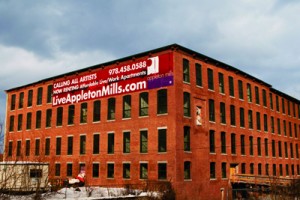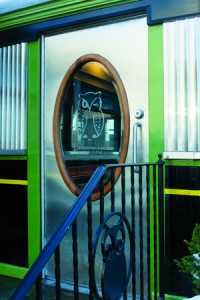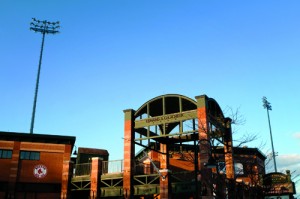Lowell breathes new life into its old assets. By Tamsin Venn
“What makes Lowell tick is a very diverse mix of people and the fact that the whole city is associated with American history,” says Paul Marion, director of community and cultural affairs for the city. “People have a sense that it’s an historic place, but it’s a living, breathing place. You can see the history on the streets and be part of it. The cultural life in the past 30 years has set Lowell apart as a vibrant city, one of the cultural hot spots in the state.”
Edward A. LeLacheur Park in Lowell, Massachusets
The old mill buildings, thanks to creative financing from private industry and government, are being recycled into affordable living spaces. The city is convenient to Routes 3, 93, and 495, and it’s a 45-minute train ride into Boston’s North Station.
“The new conversion of mills is smart and responsible,” says Marion. “Lowell has recycled its assets, as opposed to destroying them and starting over. It’s a really good model and lesson. It’s meant that Lowell has maintained a special character and distinct identity by reusing its historical forms.”
Lowell was the first large-scale planned industrial city in the country, created in the 1820s by several Boston merchants who envisioned building textile mills in New England to end reliance on exports from England. Despite an earlier start on the banks of the Charles River in Waltham, the group preferred a farm site farther north on the Merrimack River. They aimed to take advantage of the existing Pawtucket Canal built around Pawtucket Falls in the 1790s and also the falls’ 30-foot drop, a powerful source of energy to run the mills. They bought 400 acres of land and built the first brick mills, naming the new city after their late colleague, Francis Cabot Lowell. On a visit to Manchester, England, in 1810, Lowell had memorized the complex workings of a power loom in an act of industrial espionage and brought the concept back to the U.S.
Yankee farm girls first worked the mills but were gradually replaced by immigrants who, despite the extended hours and lowered wages, still found life to be a great improvement over what they had left behind. Whole families worked in the mills, sustained by ethnic enclaves: Irish, French-Canadian, German, Greek, Polish, Brazilian, Russian, and Middle Eastern.
Hard times then came to Lowell. Walkouts and strikes occurred. The mill owners moved south for cheaper labor. The Depression hit. The World Wars saw brief surges in demand for textile and munitions, but even that wave of employment passed by Lowell. By the 1960s, Lowell was a ghost town, with 10 mill complexes deserted and forgotten and some being torn down in a wave of urban-renewal fervor.
The visionaries collaborated again. In 1978, with help from the late Senator Paul Tsongas, a brilliant match of public and private partners created the Lowell National Historic Park and put the story of Lowell back together in the abandoned mills. The city’s rebirth continued with the arrival of UMass Lowell and Wang Laboratories. But high tech went bust and Lowell struggled again.
 Today, Lowell is in the midst of yet another upswing. You can walk along streets lined by nearly six miles of canals, or hop on a trolley or canal boat. Then there are the galleries, shops, theatre, sports teams, concerts, and lectures; the list goes on. True to its immigrant heritage, cuisine here includes Cambodian, Brazilian, Chinese, Greek, and Mexican.
Today, Lowell is in the midst of yet another upswing. You can walk along streets lined by nearly six miles of canals, or hop on a trolley or canal boat. Then there are the galleries, shops, theatre, sports teams, concerts, and lectures; the list goes on. True to its immigrant heritage, cuisine here includes Cambodian, Brazilian, Chinese, Greek, and Mexican.
“Lowell has a reputation where newcomers are welcome and people can take their first steps to establish themselves in the country and in the state,” says Marion. “Some of it has to do with access to affordable housing and networks of people who have settled here.” The city boasts the biggest Cambodian population in the U.S. outside Long Beach, California. The Angkor Dance Troupe even has its own office. Recent immigrants have arrived from Burma, Africa, Russia, and Iraq.
Lowell also has open space. The 1,000-acre Lowell-Dracut-Tyngsboro State Forest offers six miles of trails, and The Greater Lowell Indian Cultural Association claims two special sites here. Back on the water at the Bellegarde Boathouse, you can learn to scull with the Merrimack River Rowing Association. Whether you’re a resident or visitor here, feel free to take your pick of things to do and see-in Lowell, anything is possible.
The Details
Date of Settlement: 1820s
Date of Incorporation: 1823
Zip Codes: 01850, 01851, 01852, 01853, 01854
Population: 104,400
Total area: 14.5 miles
Median household income: $46,774
Schools: 14 elementary schools, 8 middle schools, 1 high school
Higher Ed: UMass/Lowell, Middlesex Community College
Notable residents: Jack Kerouac; Paul Tsongas; James McNeil Whistler (artist); Bette Davis; Ed McMahon; An Wang (inventor); Micky Ward (boxer whose life was portrayed in The Fighter)
Artists in Residence Local artists move home to the renovated
Appleton Mills
.

Appleton Mills
This spring, 130 artists will move into “insanely cheap” housing in the renovated
Appleton Mills
in downtown Lowell, where rents range from $400 to $900.
“This will be the largest affordable housing [structure] for artists that has received funding from the state,” says Abby Goldenfarb, project manager for Boston developer Trinity Financial.
Besides a low-income requirement, residents must prove a primary living from the arts. Residents will decide how to use space, making the Mills a true artists’ collaborative. Sculptor Kim Radochia of Beverly has created the metallic four-story atrium centerpiece called “Waves,” which reflects the nearby Hamilton Canal.
The $43 million
Appleton Mills
kicks off a 10-year, $800 million redevelopment of the Hamilton Canal District, 14 acres characterized by vacant lots, abandoned mills, rickety bridges, and dismal streets, forming the “industrial canyon” in Lowell’s 19th century heyday. Offices, shops, 700 housing units, a $100 million courthouse, and parks will link to the rest of downtown by new bridges, canal walkways, streets, and trolleys. 219 Jackson Street, Lowell, 978-458-0588, appletonmills.com.
Out and About The top spots for culture, cuisine, and retail therapy
New England Quilt Museum The only museum in the Northeast dedicated to collecting, preserving, and exhibiting quilts. Shattuck Street, 978-452-4207, nequiltmuseum.org.

Brush Art Gallery
Lowell Spinners This Boston Red Sox minor league team is where Kevin Youkilis got his start. Box tickets at $10 make this an affordable family outing. LeLacheur Park, 450 Aiken Street, 978-459-1702, lowellspinners.com.
Lowell National Historic Park Follow industrial history at the Boott Cotton Mills Museum and the Mill Girls and Immigrants Exhibit, also trolley or canal boat tours. 246 Market Street, 978-970-5000, nps.gov/lowe.
Brush Art Gallery
and Studios A lively gallery sells quality art from worldwide artists. 256 Market Street, 978-459-7819, thebrush.org.
Lowell Memorial Auditorium See top performers at off-Broadway prices. 50 East Merrimack Street, 978-454-2299, lowellauditorium.com.
Merrimack Repertory Theatre Seven plays a year lure an ever-growing audience. 50 East Merrimack Street, 978-654-4678, merrimackrep.org.
American Textile History Museum A recent $2 million renovation shows fabric evolution from flax to recycled soda cans. 491 Dutton Street, 978-4441-1412, athm.org.
Lowell Folk Festival July 29-31 marks the 25th anniversary of this free international music festival. The ethnic food is phenomenal. 978-970-5000, lowellfolkfestival.org.
Athenian Corner Restaurant Moussaka, spanakopita, roast leg of lamb, avgolemono, or faki, this restaurant serves authentic Greek food prepared by the Panagiotopoulos clan. 207 Market Street, 978-458-7052, atheniancorner.com.
Western Avenue Studios In two renovated mills, nearly 200 artists open their studios the first Saturday of every month, many items priced under $50. 122 Western Avenue, 978-349-8069, westernavenuestudios.com.
Lowell Celebrates The Jack Kerouac Commemorative in Eastern Canal Park pays homage to this Beat-era author in words carved on eight granite pillars. lowellcelebrateskerouac.org.
Old Court Pub A bit of Ireland serves Irish stew, shepherd’s pie, bangers ‘n’ mash, and fish ‘n’ chips to die for, washed down
by a Guiness. 29 Central Street, 978-452-0100, oldcourtirishpub.com.
Welles Emporium The store sells handmade gifts, clothing, jewelry, home accessories, collectibles, and toys not found in any mall. 175 Merrimack Street, 978-454-4401, wellesemporium.com.

Four Sisters Owl Diner
Rafting The same rapids that brought the textile industry also power a thrilling raft ride on the Concord River, April through May. 800-532-7438, lowellandtrustreet.org.
Four Sisters Owl Diner
A local breakfast spot serves big portions for reasonable prices, and a dozen omelets named after Lowell streets. 244 Appleton Street, 978-453-8321.
Blue Taleh Serves Thai food you would otherwise have to go to Thailand to experience. 15 Kearney Square, 978-453-1112, bluetalehlowell.com.

